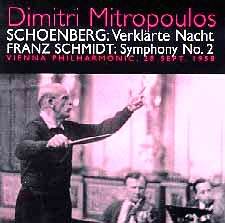FRANZ SCHMIDT
Symphony No 2 (1913) [46.16]
ARNOLD SCHOENBERG
Verklärte Nacht (1899 arr 1917) [31.06]
 Vienna PO/Dimitri
Mitropoulos
Vienna PO/Dimitri
Mitropoulos
rec live concert 28 Sept 1958, Grosser Saal, Musikverein, Vienna
 MUSIC AND ARTS
CD-991 [77.34]
MUSIC AND ARTS
CD-991 [77.34]
Music and
Arts

Schoenberg and Schmidt were born within two months of each other. While
Schoenberg set the agenda for a major (at one stage seemingly all-obliterating)
stream in Twentieth Century music, Schmidt took tonality to its furthest
outposts. He gloried in its magnificence and its decay much as Korngold,
Schreker, Weigl and Zemlinsky had. Schoenberg's Gurrelieder and
Verklärte Nacht traverse similar waters to those navigated by
Schmidt but Schoenberg travelled yet further both geographically (California)
and musically (dodecaphony).
Mitropoulos and the Viennese revel in the Schoenberg with its mordant stabs
(9.10), its sentimental solo violin (16.33) and whipped up Elgarian tempests
(21.56) joying in its bass growl and the luxuriantly ample swell of strings
(27.50).
Turning to the Symphony, Schmidt embraces the full orchestra and in fact
augments it with five clarinets, four trumpets, eight horns and a massed
string section to match. The mellifluous babble of the opening pp
is most refreshingly caught by Mitropoulos in a suave echo of Smetana's
Vltava. The Symphony catches something also of the celebratory rondo
character of Mahler 5 and 7. The orchestra's stately horns and trumpets breast
the harmonic complexities with subtlety and the strings are similarly assured
(try the shy upsurge at 6.40). The performance is grace personified (try
11.30). This is a 'live' event and one within chronological hailing distance
of the impoverishment of the Second World War. This perhaps accounts for
the clarinet section's less than smoothly tripping account of themselves.
It certainly makes itself known in the occasional cough from a member of
the audience - not that this does anything other than intensify the experience.
There is a supercharged Mendelssohnian witchery about the skittish parts
of this score (6.50). The third movement combines baroque idyll and a
Beethovenian pastoral scene.
As to the competition - well, there are no other live concert performances
- at least not commercially available. I have a fine VPO/Leinsdorf account
on radio tape from 27 October 1984) and a less than perfect version from
Alfred Walter and the BBCPO (21 September 1993). The old Milan Horvat (Austrian
Radio SO) version on Classical Excellence LP CE11044 is not worth seeking
out so occluded is the sound. The practical alternatives are two-fold. L'udovijt
Rajter on a 1987 Opus CD (9350 1852) is lean in sound and approach. He is
extremely sympathetic and a master at balancing the internal voices amid
the dense profusion of motifs. Chandos (CHAN 8779 also available as part
of a 4-CD set) however catch Neeme Järvi and the Chicago Symphony in
full cry. This is a great orchestra basking in the challenge of a great symphony.
In no other performance does the gong register with such refinement both
in ppp and in expressive thunder. The countervailing factor is that
the instrumental strands in the Chandos can become garbled amid the richness
of the sound-scape. There are some great climactics in this kingly symphony.
Mitropoulos is unmissable in very clean and generously proportioned mono.
The sense of grand occasion (of history forming and rearing up in front of
us) is palpable. He is fleet of foot (Allegretto: 17.29 against 19.02
Järvi and 19.35 Rajter) but the 1950s VPO is not heard as the equal
of the Chicagoans. The Viennese woodwind, for example, do not have the fluency
of their counterparts in Chicago.
Music and Arts provide Schmidt followers with the ideal companion to either
the Rajter (lean and powerful) or the Järvi (fluency, stupendous recording
quality and wealth of effect).
I rate the Schmidt very highly and have come away from listening to these
discs with renewed love for this symphony among symphonies - a work which,
it was claimed, does not travel. Absurd - this work is a triumph among late
romantic symphonies. The Mitropoulos is 'live' with that sense of edge-of-seat
spontaneity. On top of which this M&A release is the only disc to
have a coupling. The M&A has extensive notes by David Breckbill and the
skilful sound reconstruction made in 1997 is by Lowell Cross. The master
source for this CD must have been of very high quality. Be warned however
- the disc is now in short supply but copies (down to the last fifty or so
I understand) are available direct from Music and Arts at www.musicandarts.com/.
Recommended to Schmidt followers and to all those who prefer their music
making to reflect a real concert experience.
Rob Barnett


